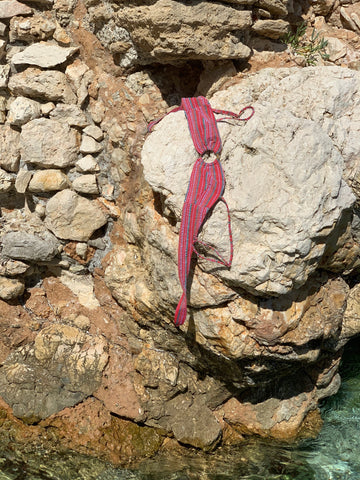Sustainability & Care

At Belize we believe that loved clothes last.
Making clothes last longer is the first step to an ethical and sustainable wardrobe.
Up to 25% of each garment’s carbon footprint comes from the way we wash and care for it*.
Nine out of 10 pieces of clothing end up in landfill long before they should, often because over-washing or not following the care instructions has caused colour fading, shrinkage and misshaping.
Washing
Hand washing is ecologically friendly and will help extend the life of your garment.
Machine washing uses on average 41 litres of water per wash, in addition to consuming energy to run the machine and heat the water.
When hand washing clothes, water and detergent choices affect how eco-friendly this activity is. Use cold water whenever possible. This uses less energy and it protects the dye in your clothes. Look for vegetable oil-based detergents instead of the standard petroleum-based detergents.
Distilled white vinegar can be used when washing, as it both deodorizes and reduces bacteria on the fabric.

Drying
Air drying your clothes on a clothes line or rack is gentle on the fabric and prevents wear and tear.
It is environmentally friendly and helps create laundry consciousness, reducing the number of times you might wash a garment.
Hang clothes neatly and well spaced to allow air circulation or lay flat across a clothes rack.
Dry Cleaning
If your clothes must be dry-cleaned, choose your dry cleaner carefully.
Traditionally, dry cleaners have used perchloroethylene to clean clothes; this chemical is both an environmental and health hazard. Look for a dry cleaning service that uses environmentally-friendly methods.
Storing
Hang your clothes with bit of space to breathe. This will reduce wrinkling and colour fading from rubbing against each other.
Use a breathable canvas storage bag to protect from direct light and moths.
*Fashion revolution
Swimwear
Hand washing protects the shape, colour and elasticity of your garment. Rinse your swimsuit as soon as possible in cool tap water after each time you wear it. Allow the suit to soak in cool water for 30 minutes if you have time. The soak will remove most of the chemicals, salt, sand, and body oil that can damage the fabric.
Special Fabric information
Linen - This is a natural fibre which at the end of life, will eventually break down in the environment.
Because of the way linen fibres are structured, overhandling can cause damage but will also soften the fabric.
Hand wash linen alongside similar lightweight or delicate fabrics and avoid wringing the fabric, which will twist the fibre in a way which is not suited.
Cotton - This is a natural fibre which at the end of life, will eventually break down in the environment
Our high quality cotton is mostly spun and dyed in Europe where it adheres to strict EU legislation on chemical and water use. In India we hand spin and hand weave our cottons using age old family traditions.
Our cottons where stated are machine washable but we advise low temperature washes and spinning so that the fibre isn't 'overworked'.
Viscose - A semi-synthetic fibre made of regenerated cellulose.
Hand washing in cold water is the safest option for washing viscose which has a tendency to shrink.
Submerge the item and gently agitate the water with your hands to evenly distribute soap. Soak for up to 30 minutes. Rinse the item well with cool water; do not wring; instead, press the water out of the item and lay it in its natural shape to dry.